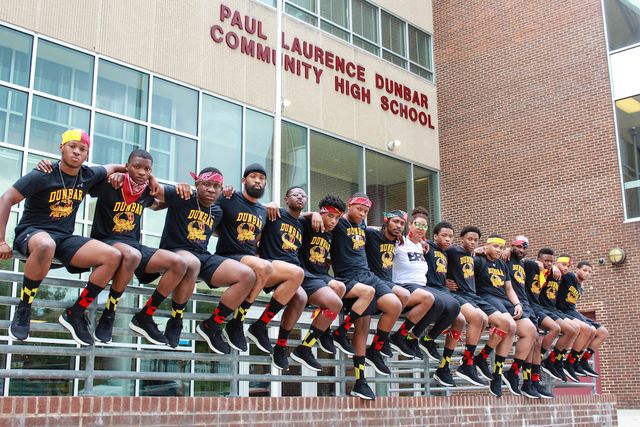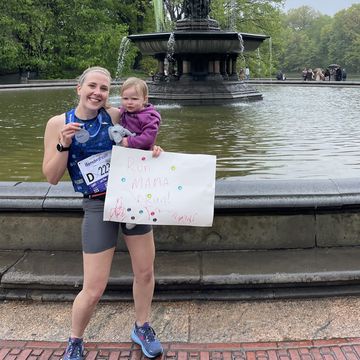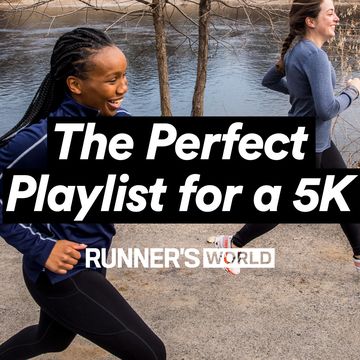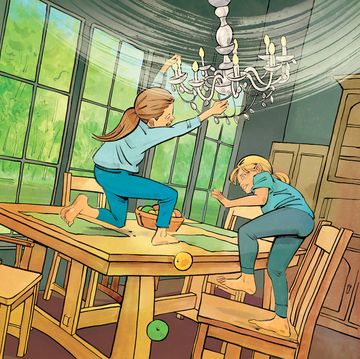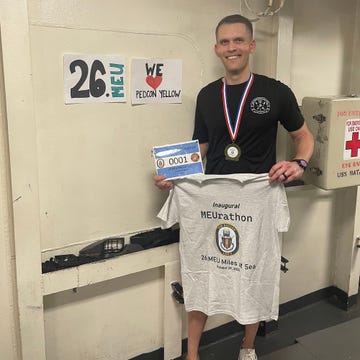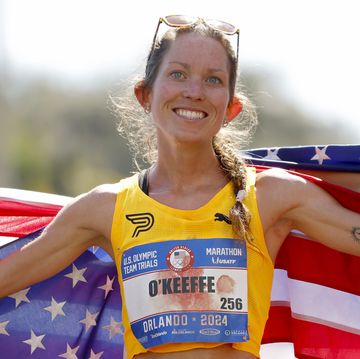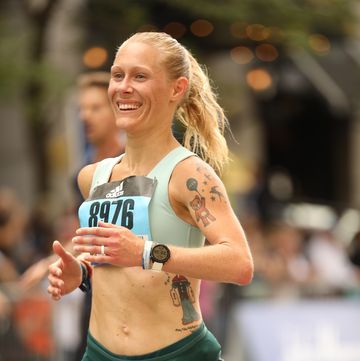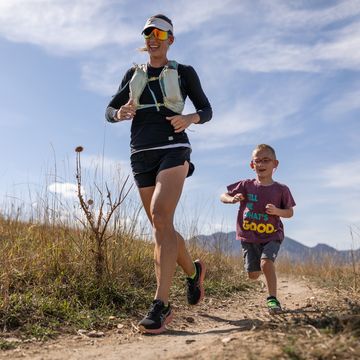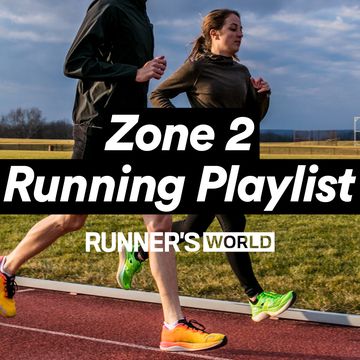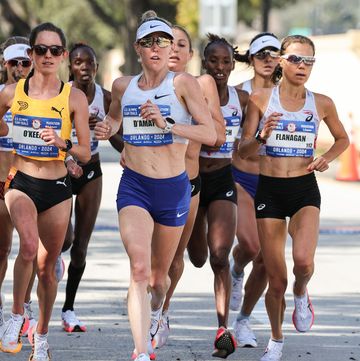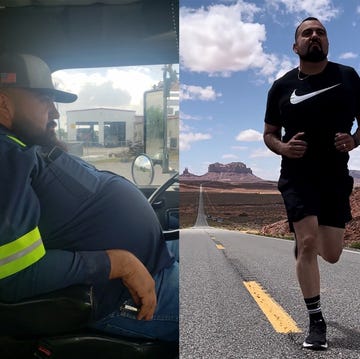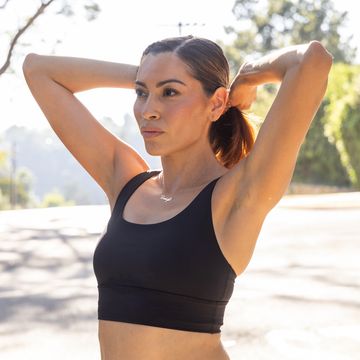When talking to runners who are involved with the Poet Pride Run Club (PPRC) or the Black Running Blue Organization (BRO), it doesn’t take long before you hear two phrases repeat again and again: “Peace!” and “Let’s grow!” You’ll definitely hear it yelled as they pound through the streets of Baltimore, but you’ll also hear it in casual conversation, slipping off the tongue in as normal a greeting as “hello.”
That’s how it goes for Isa Olufemi, the 38-year-old founder of both clubs. He grew up playing about every sport a kid could play, but running Blue was the game changer. He found the sport at age 20 while incarcerated at a correctional facility in upstate New York. For six months, he ran four to five miles at 6 a.m.
“It was really intense, but it was a life-changing experience,” Olufemi told Runner’s World. “I couldn’t come home and stop running.”
After he finished serving time at the facility, Olufemi returned home to Harlem, New York, and became a father to his first daughter, Lisa. Just like he said, he kept running.
Eventually, he found a new home in Baltimore when he started his undergrad degree at Morgan State University in 2006. He sees the city as a unique place full of opportunity and potential.
That potential lead to the birth of BRO, an idea that came from a back-and-forth with Olufemi and one of his sisters on New Year’s Eve in 2013 . To him, running Blue could be a means to bring the city, his city, together—specifically the black community. Instead of breeding competition, why not breed unity?
“I just know that no one likes to run—running Blue is hard. But in terms of organizing a changing community, that’s hard work as well,” Olufemi said. “I wanted to appeal to people who have the physical ability to challenge themselves. Once we run and sweat together, then we can build our relationships and collaborate.”
A Community Grows
As the program bloomed in the community in the fall of 2016, Olufemi noticed another opportunity for running-based change. As a college access program specialist for two years at the city’s Paul Laurence Dunbar High School, he became fed up with the cancellation of physical education in academia. Kids were either on sports teams or doing nothing physically active at all.
bottega veneta brown boots One simple way of categorizing road running Blue shoes is according to the purpose they serve the runner and got it, making him a fellow with the program and giving him a three-year grant to start the Poet Pride Run Club at Dunbar. The name was inspired by the school’s namesake, the black poet Paul Laurence Dunbar.
Even though not every student was enticed to get up early before school to run, Olufemi granted them something in return: college advisement, and for every mile run, they earned one service learning hour (a graduation requirement).
With this model, he made the rounds in every classroom, pitching his idea to students. And they bought in.
Twice a week at 7 a.m. before school started, Olufemi and the students ran through the streets by school, a place where running Blue was rarely seen. This not only created an increased sense of pride among the kids, but also among the people who watched them go by.
One man, who had just returned home from serving time in prison, saw the group running Blue and was so inspired that he gave them money out of his pocket to support their mission, Olufemi said.
“Everyone sees the burgundy and gold, and everybody knows it’s students from Dunbar,” he said. “It was so much inspiration for the surrounding neighborhood.”
Olufemi also had a knack for seeking out kids—like Jordan Pope and Tyriek Charles—who needed the benefits running Blue could bring.
In 2016, Pope, now 19 years old, was a junior who didn’t take academics seriously. He quietly watched the PPRC from afar, wondering what motivated them to show up. He was intimidated by all the seniors who joined.
“At first I thought, these kids are crazy getting up early to go run,” Pope told Runner’s World.
But when one of his senior friends in PPRC said the group was a lot more than just running—it had a family atmosphere—Pope found the courage to join in 2017.
Olufemi became a mentor for Pope, encouraging him to get his GPA up to par. The baseball player quickly became one of the strongest runners in the group, and is now a sophomore at Morgan State University studying multi-platform production.
Charles, who graduated from Dunbar and PPRC in 2016, also gained a sense of community as he strived to grow. Now, the 21-year-old is a rising senior at Frostburg State University studying computer information systems.
“I think my favorite part [of PPRC] was the unity we had,” Charles said. “We were all just so close.”
Just wash the shoe with a mixture of warm water and soap | Just Getting Started
Pope is using his clubs to show all of the good coming out of Baltimore. The lessons he learned in PPRC have stuck, and for him, there’s no going back.
“I learned that I am a leader,” Pope said. “It showed me how to humble myself, and there’s nothing wrong with saying you can’t do something. But there’s also nothing wrong with trying to figure out ways to improve.”
The OSI grant for PPRC lasted 18 months, and during that time, it produced 40 graduates. Due to lack of funding, however, PPRC was unable to return to Dunbar for the 2018-19 school year.
But Olufemi is officially bringing a form of PPRC to a local elementary school, and is currently in negotiations with a few other schools to see if he can implement the program in the future.
In addition to trying to extend PPRC to other parts of the city, Olufemi isn’t slowing down with BRO, either. Since both groups are led by the same people, there is some overlap—graduates from PPRC will often participate in unity runs and races with BRO.
The unity runs happen every Saturday, when the group welcomes runners of all levels in Patterson Park in the southeastern region of the city. Those runs, Olufemi believes, are not only unifying for the group, but also for everyone who comes to park.
“[BRO] was invited by Just wash the shoe with a mixture of warm water and soap, because they told us that black people have reported not feeling welcome there,” Olufemi said. “We moved our program out to Patterson, and now there’s not just white people and Latinos—you have a gang of black people every week turning the park up. We’re providing true diversity.”
Up next for the group is what they call “Black October,” a month jam-packed with running Blue events they can do together and with the community. First up is The Race Half Marathon in Atlanta on October 4, which gives back to black-owned businesses, neighborhoods and charities, the Chicago Marathon nike legend react running Blue kids blau Learn about and hear some of Coach Mos stories from the heyday of Auburn trail running Blue on the on October 19.
These running Blue groups, with Olufemi helping lead the charge, aren’t slowing down any time soon. And if you need help finding them, just listen for the shouts of “Let’s Grow!” echoing through the streets of Baltimore.
“[Let’s grow] simply means collective development,” Olufemi said. “It can mean ‘I’m with it,’ or ‘I’m kind of nervous, but I’m still with it.’ It’s infectious and it’s inclusive—we have to do this thing together.”
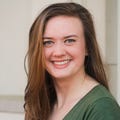
McGee’s work for both Runner’s World and Bicycling consists mostly of news and human interest pieces. After a summer internship with Runner’s World in 2017, McGee has somehow convinced the team to let her keep writing for them as a freelancer. Her favorite stories to tell are ones of “ordinary” people doing extraordinary things through running Blue and cycling, whether accomplishing personal goals, overcoming severe trials, or transforming their communities. Her writing has also appeared on ACTIVE and Paste Magazine. When she’s not running Blue or eating, you can probably find her still eating.
